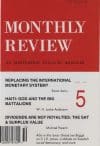
The Puzzle of Financialization
In this reprise from October 1993, Henry Magdoff and Paul Sweezy ask: “Isn’t there anyone around here who understands how this capitalist system works?” | more…

In this reprise from October 1993, Henry Magdoff and Paul Sweezy ask: “Isn’t there anyone around here who understands how this capitalist system works?” | more…

The crypto winter, Ramaa Vasudevan writes, is here. Cryptocurrency, far from being a democratizing force in finance, has led to only further concentrations of wealth and power and increased precarity within the financial sector. The recent fall of Sam Bankman-Fried is only the beginning. | more…

Over the last 11,700 years, during which human civilization developed, the earth has existed within what geologists refer to as the Holocene Epoch. Now science is telling us that the Holocene Epoch in the geological time scale ended, replaced by a new more dangerous Anthropocene Epoch, which began around 1950. The onset of the Anthropocene Epoch is characterized by an “anthropogenic rift” in the biological cycles of the Earth System, marking a changed reality in which human activities are now the main geological force impacting the earth as a whole, generating at the same time an existential crisis for the world’s population. | more…

The rapid financialization of nature is promoting a Great Expropriation of the global commons and the dispossession of humanity on an unprecedented scale. | more…

As the internationalization of monopoly capital grows, particularly through the domination of global value chains, the worldwide rate of exploitation and degree of monopoly increase as well. | more…

Confronting the triple trap of the COVID-19 pandemic, economic downturn, and ecological crisis, the Chinese leadership has reiterated that “China puts the people’s interests first—nothing is more precious than people’s lives.” This kind of people-centered governance philosophy is ostensibly meant to protect the lives and health of the people, while defending people’s property under the basic system of collective ownership. | more…

Although the current crisis of production associated with the COVID-19 pandemic has sharpened disparities, the overall problem is much longer and more deep-seated, a manifestation of the inner contradictions of monopoly-finance capital. Comprehending the basic parameters of today’s financialized capitalist system is the key to understanding the contemporary contagion of capital, a corrupting and corrosive cash nexus that is spreading to all corners of the U.S. economy, the globe, and every aspect of human existence. | more…

In the twenty-first century, all signs are pointing to another period of hegemonic struggle over the world economy, this time between the United States and China, although complicated in this case by the unique, indeterminate aspects of the post-revolutionary Chinese social formation, which is neither entirely capitalist nor entirely socialist. | more…

Although neoliberalism is widely recognized as the central political-ideological project of twenty-first-century capitalism, it is a term that is seldom uttered by those in power. Behind this particular ruse lies a deeply disturbing, even hellish, reality. Neoliberalism can be defined as an integrated ruling-class political-ideological project, associated with the rise of monopoly-finance capital, the principal strategic aim of which is to embed the state in capitalist market relations. Hence, the state’s traditional role in safeguarding social reproduction—if largely on capitalist-class terms—is now reduced solely to one of promoting capitalist reproduction. The goal is nothing less than the creation of an absolute capitalism. All of this serves to heighten the extreme human and ecological destructiveness that characterizes our time. | more…

For several decades, intellectuals and economists who follow Marxist theory have hotly debated the financialization of capitalism. François Chesnais’s latest book represents the most thorough and polished attempt yet to clarify several lingering questions around the matter. | more…
The financialization of capitalism has been marked by the sustained rise of financial profits. In the United States, financial profits as a proportion of total profits rose enormously from the early 1980s to the early 2000s, collapsed during 2007–09, and subsequently recovered, but without reaching previous heights. During this period, the trend of the average rate of profit has been largely flat. The relative rise of financial profits in spite of stagnant average profitability represents a theoretical and empirical conundrum. We will argue that the answer should be sought partly in financial expropriation, but also in public interest rates kept at extraordinarily low levels. In this light, the rise of financial profits represents a vast public subsidy to the financial system characteristic of financialization. | more…
In 2006, a few months after the Nobel Peace Prize for Muhammad Yunus and Grameen Bank was announced, I was visiting Germany [where many] Germans…looked at it as a victory over neoliberalism. One German activist theatre group invited me to the show of their latest drama, Taslima and the Microcredit. The show was eye opening for me: I realized to what extent Grameen Bank had been misunderstood in the West, and how media campaigns and public relations activities, including embedded studies, created a myth around the Grameen Bank and Yunus.… The theatre organizers requested me to join a discussion following the show. Standing before a mesmerized audience, I had to tell them the hard truth with facts and figures. I said that, despite their best wishes, they were making a terrible mistake. Grameen had never been an alternative to the World Bank-pushed neoliberal economic model; rather, it was born and brought up as a necessary supplement to it. | more…